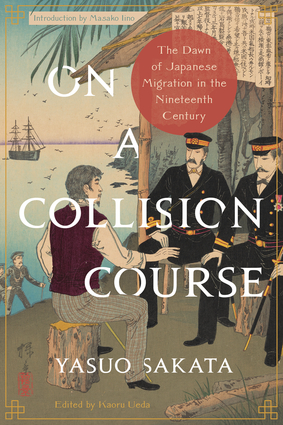

On a Collision Course
The Dawn of Japanese Migration in the Nineteenth Century
HISTORY
300 Pages, 6 x 9
Formats: Paperback, ebook: PDF, Mobipocket, ebook: EPUB
Paperback, $21.95 (US $21.95) (CA $29.95)
Publication Date: July 2020
ISBN 9780817923556
Overview
In five meticulously researched essays, Yasuo Sakata examines Japanese migration to the United States from an international and deeply historical perspective. Sakata argues the importance of using resources from both sides of the Pacific and taking a holistic view that incorporates US-Japanese diplomatic relationships, the mass media, the American view of Asian populations, and Japan's self-image as a modern, westernized nation. In his first essay, Sakata provides an overview of resources and warns against their gaps and biases; those that remain may reflect culturally based inaccuracies. In the other essays, Sakata examines Japanese migration through a multifaceted lens, incorporating an understanding of immigration, labor, working conditions, diplomatic relationships, and the effects of war and mass media. He further emphasizes the distinctions between the dekasegi period, the transition period, and the imin period. He also discusses the self-image among Japanese as distinct from the Chinese, more westernized and able to assimilate-a distinction lost on Americans, who tended to lump the Asian groups together, both in treatment and under the law. Japan's Meiji era brought the opening of Japanese ports to Western nations and Japan's eventual overseas expansion. This translated volume of Sakata's well-researched work brings a transnational perspective to this critical chapter of early Japanese American history.Reviews
"Professor Sakata's pioneering archival work and scholarship anticipated the transnational turn in United States immigration and ethnic history while also challenging perspectives in Japanese studies. In particular, his broad and deep knowledge of both English and Japanese language sources informs these original and important essays on early Japanese migration that will be of interest to a wide range of scholars across multiple fields and areas of study." David K. Yoo, vice provost and professor, UCLA"At last, On a Collision Course provides English-speaking readers with invaluable access to the scholarship of Yasuo Sakata, arguably one of the foremost trailblazers in Japanese American studies. Superbly translated, the volume highlights the contemporary relevance of Sakata's works published in Japan over a quarter of a century ago. While based on impeccable empirical research, the selected essays offer an in-depth look at how the early Japanese immigrant experience unfolded in the intertwined contexts of US-Japan diplomacy and the local race politics of the American West. Still with ample power to inspire, Sakata's studies represent migration history writing at its best and are a must-read for anyone interested in transpacific working-class migration and Japanese American history." Eiichiro Azuma, associate professor of history and Asian American studies, University of Pennsylvania
"Yasuo Sakata in On a Collision Course lays out the challenges of researching the Japanese American history: the massive loss of historical archives during the 1906 San Francisco Great Fire and the 19425 internment; and the commonplace practice of secondhand citations and historical distortions in the Nikkei communities' publications in early decades. How could one overcome these problems, if at all? This is a must-read text for those who seek an answer to this question." Yuma Totani, professor of history, University of Hawaii, and author of The Tokyo War Crimes Trial
"This is an exceptionally erudite and timely publication of Yasuo Sakata's historical studies of migration between Japan and the United States during the Meiji era. Sakata's research amounts to essential reading on the place of Issei labor and patterns of mobility caught between the expansionist and exclusionist policies of two rising world powers. Appearing for the first time in English translation, with a preface by Kaoru Ueda and critical introduction by Masako Iino, it provides nuanced, multilayered analyses of the archives on both sides of the Pacific instrumental for restoring this vital transnational history." Seth Jacobowitz, assistant professor of East Asian languages and literatures, Yale University, and author of Writing Technology in Meiji Japan
"Yasuo Sakata was a pioneer, approaching early Japanese American studies as a field deserving of scholarly attention from both sides of the Pacific. His insistence on the need for bilingual facility and reliance on trustworthy historical documents and archives was only rarely possible, but it will continue to be a beacon and vision for aspiring scholars in the field. This translated volume is most welcome; it is a major contribution." Franklin Odo, John J McCloy Visiting Professor of American Institutions and International Diplomacy, Amherst College
"Revisiting pioneers' works always results in 'new' findings, perspectives, and surprises. This translated collection of essays written by a pioneer scholar of Japanese American history, Yasuo Sakata, shows us the significance of how historians decipher primary sources, master the languages of research, and pay attention to both micro- and macroperspectives. Scholars who are interested in US-Japan history, immigration history, and Japanese American studies will benefit from reading his valuable essays for better understanding the development of historical research on Japanese immigrants and their descendants in the United States." Mariko Iijima, Associate Professor, Sophia University



